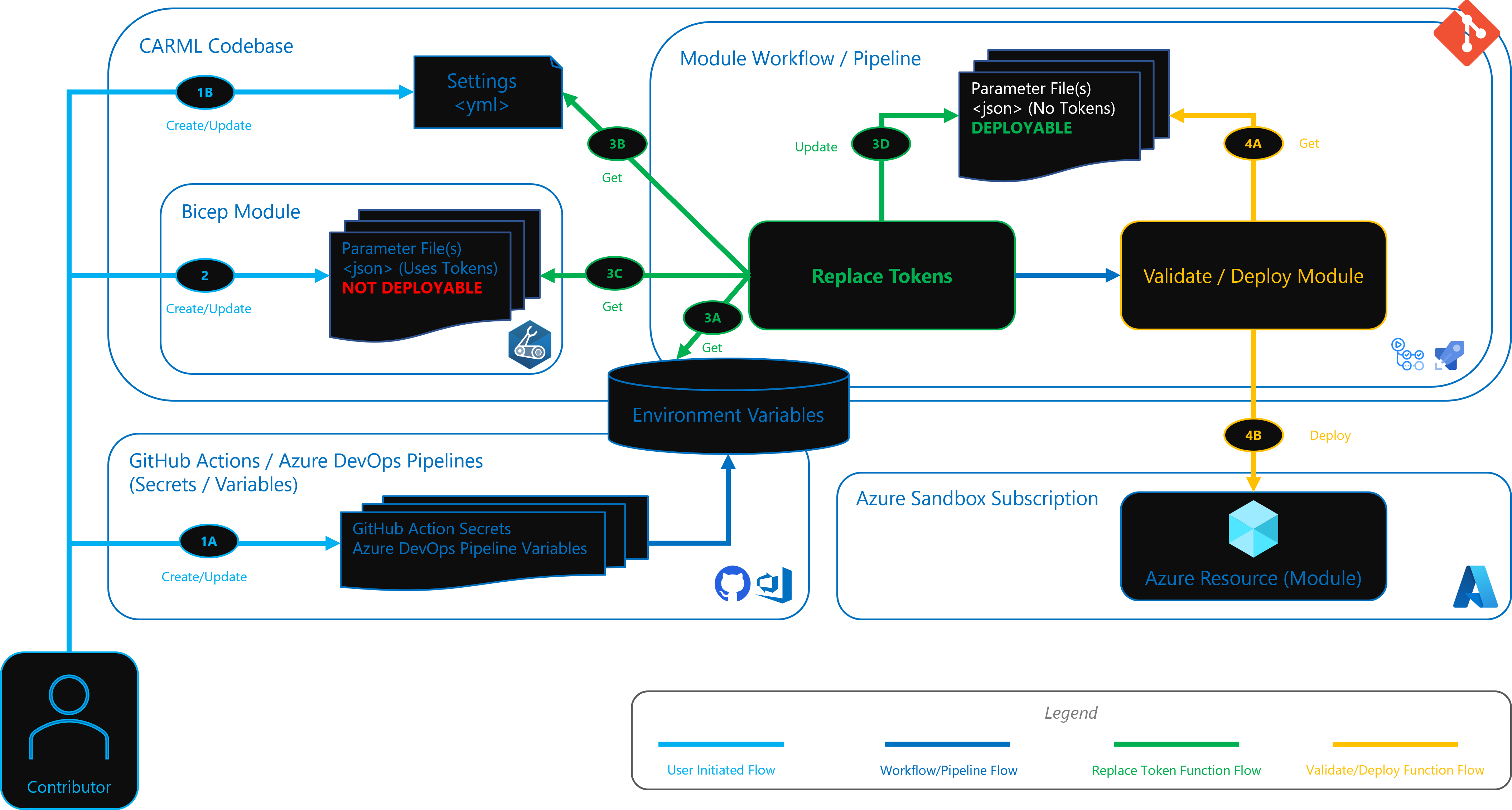-
Notifications
You must be signed in to change notification settings - Fork 455
The CI environment Token replacement
This section provides details on the tokens replacement functionality that enables the use of tokens inside module test files instead of plain text strings.
Tokens allow you to test deploying modules in your own environment (i.e., using tokens for your naming conventions), or apply other customizations to your resources (i.e., injecting a subscription ID inside a Resource ID string).
The module pipelines leverage a token replacement function that enables module test files to contain tokens (i.e., [[subscriptionId]], [[tenantId]]) instead of using static values. This helps with the following:
- Allows the repository to be portable without having static values from where it was cloned.
- Enables dynamic updates of the tokens from single locations without having to modify all files.
- Not adding more environment variables to workflows/pipelines whenever new tokens are required for the environment.
There are 2 types of tokens that can be applied on a module test file:
These are tokens constructed from environment variables, which are defined in the workflow (Pipeline). Review Getting Started - GitHub specific prerequisites for more information on these environment variables.
-
[[subscriptionId]]: Will point to the Azure subscription. -
[[managementGroupId]]: Will point to the Azure an Azure Management Group. -
[[tenantId]]: Will point to the Azure Tenant ID.
These are tokens defined in the Git Repository inside a settings.yml file. This allows creating tokens that are local and updatable via Source Control mechanisms. Here is an example on where these tokens are stored. You can add key-value pairs as required:
localToken_tokenA: 'foo'
localToken_tokenB: 'bar'
Note: The CI pipelines automatically removes the
localToken_prefix from the name when processing the tokens replacement. This means that your actual token name istokenAand NOTlocalToken_tokenA.
Let's say you'd want to use this token inside a Key Vault module test file, to deploy the Key Vault with a name that contains this token:
"parameters": {
"name": {
"value": "[[tokenA]]-keyVault-[[tokenB]]"
}
}Once the Key Vault is deployed, you'll notice that the Key Vault name in Azure will be foo-keyVault-bar
The token prefix '[[' and suffix ']]' in the above example are also configurable in the settings.yml file and are used to identify the tokens in the files.
The solution comes with one predefined local token namePrefix. This token is leveraged in most of the parameter & test files for deployments. It allows using a consistent naming prefix that is applied to all resources being tested. There are two ways this token can be set and one will take precedence over the other:
-
By updating the value of
localToken_namePrefixin the settings.yml, which then becomesnamePrefixwhen the pipelines run. -
Creating a GitHub Secret / ADO variable called
TOKEN_NAMEPREFIX, which then becomesnamePrefixwhen the pipelines run. If created as a secret or ADO variable, it is only applied if thelocalToken_namePrefixin the settings.yml is left empty.
When validating modules through the CI environment, you must update it to a custom value as described in the Update default nameprefix paragraph. This is done to avoid conflicts with resources requiring a globally unique name, such as storage accounts or Key Vaults.
Note: Do not store sensitive information in this location as they will be present in your Git History. Follow best practices and guidelines on how to handle secrets in template deployments.
The below image compares the different token types that can be used for module test file tokens:

The below diagram illustrates the Token Replacement Functionality via the validate module deployment Action/Template.

-
1A. The user creates default tokens as GitHub Secrets or Azure DevOps Pipeline Variables, that are injected as environment variables.
-
1B. The user can also create local custom Tokens in the settings.yml. Tokens start with
localTokens_and then followed by the actual token name (e.g.tokenA). This prefix gets removed by the CI leaving the original token name -
2. The module test files can now be tokenized as per required value. And the token format can look like
[[tokenA]]. Example:"adminPassword": { "reference": { "keyVault": { "id": "/subscriptions/[[subscriptionId]]/resourceGroups/validation-rg/providers/Microsoft.KeyVault/vaults/[[tokenA]]-keyVault" }, "secretName": "[[tokenB]]" } }
-
3A. The Replace Tokens function gets the default tokens from the environment variables.
Default Tokens are harder to scale as they are explicitly defined in deploy/validate task, workflows and pipelines, and these components must be updated as you create more tokens.
-
3B. The Replace Tokens function gets local custom tokens from the settings.yml.
Local Tokens are easier to scale as you just need to define them in this file without adding new environment variables or modifying workflows or tasks.
-
3C. The Replace Tokens function gets the module test file (tokenized and not deployable) and then all tokens are processed for replacement.
-
3D. The updated module test file is then saved, replacing the tokenized version. This file is now 'deployable'.
-
4A. The Validate/Deploy function retrieves the latest updated module test file.
-
4B. The Validate/Deploy function validates the deployment artifacts for the module before deploying it to the Azure Sandbox Subscription.